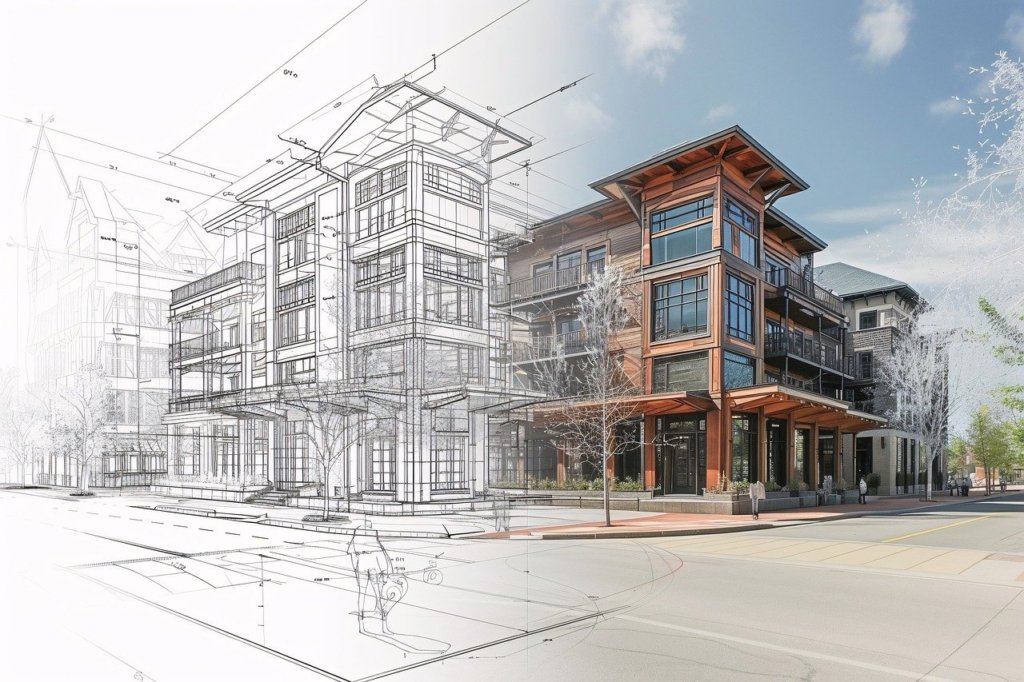AI’s Impact on Project Planning: From Design to Construction
Artificial Intelligence (AI) has revolutionized project planning in the realm of architecture and construction. By harnessing the power of AI, professionals in these industries have been able to streamline various stages of project planning, from initial design concepts to the actual construction process. Let’s delve into the key aspects of AI’s impact on project planning.
Streamlining Architectural and Planning Stages with AI
AI is increasingly being integrated into architectural and planning stages to enhance efficiency and accuracy. Through AI algorithms and data analysis, architects and planners can generate innovative designs, optimize layouts, and even predict possible challenges before they arise. This advanced technology enables professionals to explore multiple design iterations rapidly, leading to a more refined and optimized final plan.
- AI algorithms for space optimization
- Automated design generation based on specified parameters
- Real-time collaboration and feedback integration
Case Studies on AI-Powered Design Tools
Several case studies have showcased the effectiveness of AI-powered design tools in project planning. For instance, companies utilizing AI algorithms for design optimization have reported significant time and cost savings. By leveraging these tools, architects and planners can create sustainable and visually appealing designs while meeting the project requirements efficiently.
Efficiency Impact on Project Planning
The integration of AI in project planning has a profound impact on efficiency throughout the entire construction process. By automating repetitive tasks, analyzing complex data sets, and providing predictive insights, AI empowers professionals to make informed decisions swiftly and accurately. This efficiency not only accelerates the project timeline but also enhances overall quality and cost-effectiveness.
AI’s impact on project planning, from design to construction, is undeniable. By streamlining architectural and planning stages, presenting compelling case studies on AI-powered design tools, and highlighting the efficiency improvements in project planning, it is evident that AI is shaping the future of architecture and construction.

Smart Building Systems: Integrating AI for Sustainable Living
Embracing artificial intelligence (AI) in smart building systems has revolutionized the way we approach sustainable living. The integration of AI technologies not only enhances the efficiency of homes but also minimizes their environmental impact. Let’s delve into the key aspects of how AI is reshaping the landscape of sustainable living.
AI’s Role in Creating Energy-Efficient Homes
AI plays a pivotal role in optimizing energy consumption within homes, leading to increased energy efficiency. Through machine learning algorithms, AI can analyze data from various sensors and devices to understand energy usage patterns. This enables AI-powered systems to automatically adjust heating, cooling, lighting, and other parameters to minimize energy waste while maintaining optimal comfort for residents.
- AI algorithms can learn from occupants’ behaviors and preferences to personalize energy settings, further reducing unnecessary energy consumption.
- Smart thermostats and HVAC systems equipped with AI can efficiently regulate temperatures based on real-time data, resulting in significant energy savings.
Innovations in Smart Building Systems for Sustainability
The continual advancements in smart building systems have paved the way for sustainable practices in construction and operations. AI-driven technologies are instrumental in creating eco-friendly buildings that are resource-efficient and environmentally conscious.
- Integration of smart sensors and IoT devices allows for real-time monitoring of energy usage, water consumption, and air quality, enabling proactive adjustments for sustainability.
- AI-powered predictive maintenance systems help identify potential issues in building infrastructure before they escalate, reducing maintenance costs and minimizing environmental impact.
Environmental Impact Enhancements with AI
AI contributes significantly to enhancing the environmental sustainability of buildings through its ability to optimize resource utilization and reduce carbon footprints. By harnessing AI capabilities, smart building systems can mitigate greenhouse gas emissions and promote a greener living environment.
AI algorithms can optimize waste management processes within buildings, facilitating recycling and proper disposal practices to minimize environmental harm.
By leveraging AI for sustainable living, smart building systems are not only becoming more energy-efficient but also paving the way for a greener and more sustainable future.
Predictive Analytics in Property Valuation: Precision in Pricing
When it comes to determining the value of a property, the use of predictive analytics has revolutionized the way in which pricing is approached. By utilizing advanced AI algorithms, property valuation has become more accurate and efficient than ever before. Let’s delve into how predictive analytics is shaping the precision in pricing within the real estate market.
AI Algorithms for Accurate Property Valuation
Predictive analytics leverages AI algorithms to analyze vast amounts of data related to various factors influencing property values. These algorithms can consider factors such as location, size, amenities, historical trends, and market demand to provide a more precise valuation of a property. By incorporating machine learning and statistical models, AI can generate reliable estimates that reflect the true worth of a property.
Influence of Predictive Analytics on Pricing Strategies
The integration of predictive analytics has a significant impact on pricing strategies adopted by real estate professionals. By having access to more accurate valuations, property owners and developers can set prices that align with market trends and consumer expectations. This leads to more competitive pricing strategies that can attract potential buyers and maximize returns on investments. Additionally, predictive analytics enables real estate agents to forecast future market conditions and adjust pricing strategies accordingly.
Competitive Pricing in Pre-Construction Projects
For pre-construction projects, predictive analytics plays a crucial role in establishing competitive pricing strategies. By analyzing data on construction costs, market demand, and projected appreciation, developers can set prices that ensure profitability while remaining attractive to buyers. Predictive analytics allows developers to optimize pricing strategies throughout the various stages of a project, ensuring that pricing remains competitive in dynamic market conditions.
In conclusion, the use of predictive analytics in property valuation has transformed pricing practices in the real estate industry. By leveraging AI algorithms, professionals can achieve greater precision and accuracy in determining property values, leading to more competitive pricing strategies and increased profitability.
Virtual Assistants and Chatbots: Revolutionizing Customer Interactions
In today’s fast-paced digital world, businesses are constantly seeking ways to enhance customer interactions and provide seamless support. The integration of virtual assistants and chatbots has proven to be a game-changer in revolutionizing customer interactions. These AI-powered tools are reshaping the traditional buyer journey and setting new standards for customer service.
Integration of Virtual Assistants in Buyer Journey
Virtual assistants play a vital role in guiding customers throughout their buyer journey. From initial product research to making a purchase decision, virtual assistants are there every step of the way. By analyzing customer preferences and behavior, these intelligent tools can provide personalized recommendations, ultimately enhancing the overall shopping experience.
Chatbots Answering Queries and Providing Information
Chatbots are designed to answer customer queries in real-time, providing instant solutions and information round the clock. Whether it’s addressing common FAQs or resolving specific issues, chatbots offer a quick and efficient way to communicate with customers. By automating customer support processes, businesses can ensure timely responses and improve customer satisfaction.
Guidance for Potential Buyers through AI
Artificial intelligence (AI) enables virtual assistants to offer tailored guidance to potential buyers based on their preferences and behavior. By analyzing customer data and past interactions, AI-powered tools can anticipate needs and provide personalized recommendations. This proactive approach not only streamlines the decision-making process but also fosters customer loyalty and trust.
In conclusion, the integration of virtual assistants and chatbots is reshaping the way businesses interact with customers. By providing personalized assistance, instant support, and tailored guidance, these AI-powered tools are revolutionizing customer interactions and setting new benchmarks for exceptional customer service.
Enhancing User Experience: AI-Powered Virtual Tours and Visualizations
When it comes to engaging users and enhancing their experience, AI-powered virtual tours and visualizations have become instrumental in revolutionizing the way people interact with digital content. In this blog section, we will explore how AI technology is shaping immersive virtual tours, impacting buyer engagement through AI-generated visualizations, and ultimately, elevating user experience across various industries.
The Role of AI in Immersive Virtual Tours
Artificial Intelligence has significantly contributed to the development of immersive virtual tours by providing advanced capabilities that were previously unimaginable. AI algorithms can now create realistic 3D environments, enabling users to experience virtual spaces in a way that feels almost tangible.
Through AI’s ability to process vast amounts of data and simulate real-world scenarios, virtual tours can offer an interactive and personalized experience to users. Whether it’s exploring a property, touring a museum, or visiting a distant location, AI technology enhances the immersion factor and brings these experiences to life.
Impact of AI-Generated Visualizations on Buyer Engagement
AI-generated visualizations play a crucial role in capturing the attention of potential buyers and increasing their engagement with products or services. By leveraging AI techniques such as machine learning and computer vision, companies can create compelling visual content that resonates with their target audience.
Whether it’s showcasing architectural designs, previewing interior décor options, or presenting product configurations, AI-generated visualizations enhance the storytelling aspect of marketing and sales initiatives. This not only attracts buyers but also helps them make informed decisions by visualizing the end result in a realistic manner.
Enhancing User Experience through AI Technology
Ultimately, the integration of AI technology into virtual tours and visualizations is aimed at enhancing the overall user experience. By leveraging AI’s capabilities to personalize content, predict user preferences, and optimize interactions, companies can create a seamless and engaging experience for their audience.
From providing personalized recommendations based on user behavior to enabling real-time customization of virtual tours, AI technology is revolutionizing the way users interact with digital content. This, in turn, leads to increased user satisfaction, higher engagement levels, and ultimately, a more immersive and enjoyable experience for all.

AI-Driven Customer Insights: Tailoring Pre-Construction Offerings
Delving into the realm of pre-construction real estate projects unveils a landscape where customer preferences play a pivotal role in shaping the final outcome. With the advent of Artificial Intelligence (AI), developers now have a powerful tool at their disposal to analyze and understand these preferences like never before. Let’s explore how AI-driven customer insights are revolutionizing the customization of pre-construction offerings.
Analyzing Customer Preferences with AI
AI algorithms sift through vast amounts of data gathered from various sources to discern patterns and trends in customer preferences. By analyzing factors such as location, demographics, past purchase behaviors, and lifestyle choices, AI can provide invaluable insights into what potential buyers are looking for in a pre-construction property.
Through sentiment analysis of social media interactions, online surveys, and feedback loops, AI can gauge the sentiment and expectations of prospective buyers. This deep understanding of customer preferences allows developers to tailor their offerings to meet the specific needs and desires of their target audience.
Personalization in Floor Plans and Amenities
One of the key benefits of leveraging AI in pre-construction projects is the ability to personalize floor plans and amenities to suit individual preferences. By analyzing data on the types of layouts, designs, and features that resonate with different customer segments, developers can create customized options that cater to diverse tastes.
AI can suggest modifications to floor plans, such as additional rooms, upgraded fixtures, or optimized spatial configurations based on the preferences identified through data analysis. This level of personalization not only enhances customer satisfaction but also increases the chances of successful sales and long-term customer loyalty.

Data-Driven Insights for Tailored Projects
By harnessing the power of AI-driven data insights, developers can make informed decisions at every stage of a pre-construction project. From selecting the ideal location and designing the layout to determining the most appealing amenities and pricing strategies, data-driven insights guide the entire development process.
Through predictive analytics, AI can even forecast future trends in customer preferences, allowing developers to stay ahead of the curve and anticipate market demands. This proactive approach ensures that pre-construction offerings are not only tailored to current preferences but also aligned with future expectations.
In conclusion, AI-driven customer insights are reshaping the pre-construction real estate landscape by enabling developers to customize their offerings in a way that truly resonates with their target audience. By leveraging AI to analyze customer preferences, personalize floor plans and amenities, and make data-driven decisions, developers can create tailored projects that stand out in a competitive market.
Automated Construction Processes: Efficiency in Development
Optimizing Construction Timelines with AI
Artificial Intelligence (AI) is revolutionizing the construction industry by optimizing construction timelines like never before. By utilizing AI-powered algorithms and machine learning, construction companies can accurately predict project timelines, identify potential delays, and streamline the overall construction process.
AI systems can analyze vast amounts of data from past projects to identify patterns and optimize scheduling. This predictive analytics help in allocating resources efficiently, scheduling tasks effectively, and ultimately speeding up the construction process.

Cost Reduction Through Automated Processes
Automated processes in construction not only save time but also lead to significant cost reduction. By automating repetitive tasks such as bricklaying, concrete mixing, and material transportation, companies can minimize labor costs and improve overall project efficiency.
Robotic automation and 3D printing technologies further contribute to cost reduction by reducing material wastage and enabling faster construction. These automated processes not only cut down on labor expenses but also ensure higher precision and quality in the final output.
Efficiency in Pre-construction Projects
Efficiency in pre-construction projects is crucial for the success of any construction endeavor. With the help of technology, pre-construction processes such as site surveying, project planning, and budget estimation can be optimized for maximum efficiency.
Virtual Reality (VR) and Building Information Modeling (BIM) tools allow stakeholders to visualize the project in detail before actual construction begins, enabling better decision-making and reducing the likelihood of costly errors during the construction phase.
In conclusion, automated construction processes driven by AI are transforming the industry by optimizing timelines, reducing costs, and enhancing efficiency in pre-construction projects. By embracing these technological advancements, construction companies can stay ahead of the curve and deliver projects faster, cheaper, and with higher quality.





